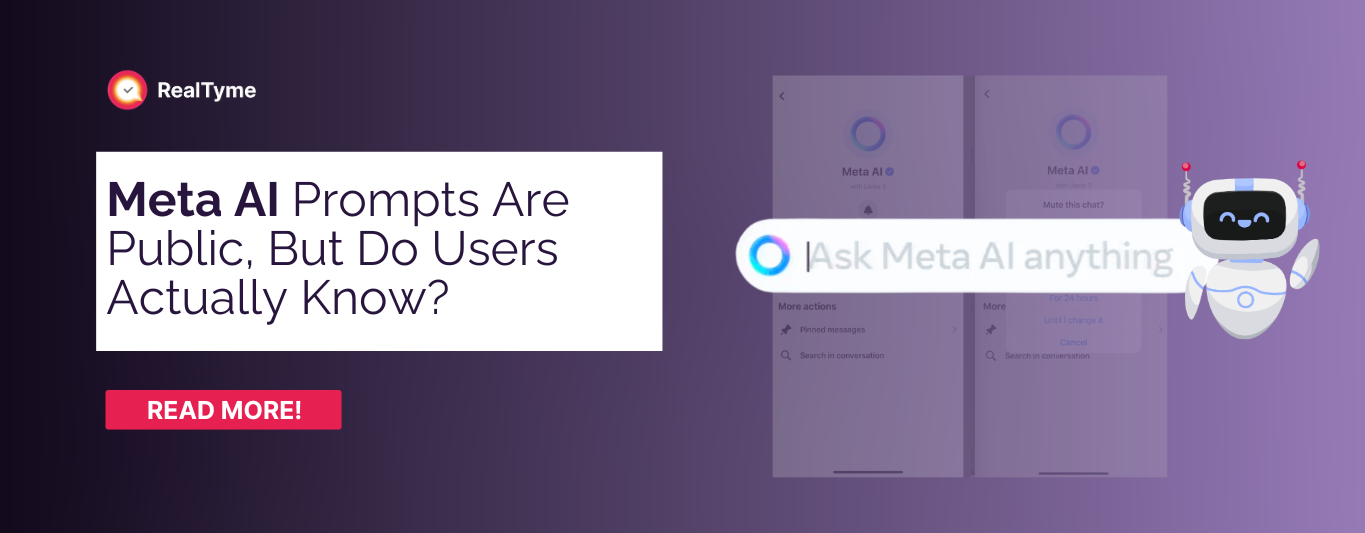Meta AI Prompts Are Public, Do Users Actually Know?

AI tools are quickly becoming as everyday as email or texting; but with that convenience comes a new dilemma that’s forcing us to rethink what privacy really means in the age of AI.
With the rapid rollout of AI assistants embedded in social platforms, we use everyday Facebook, Instagram, WhatsApp, and now a standalone Meta AI app billions of users are engaging in what they believe are private, one-on-one chats. They're asking for help with work assignments, relationship advice, health concerns, or simply exploring their identity through AI-generated conversations.
But here’s the catch: those prompts aren’t always private. And far too few users realize that their interactions with Meta AI can be made public by default; sometimes instantly, and often without any clear warning.
While Meta markets its AI as a friendly, intelligent assistant that lives within your favorite apps; ready to support you with everything from daily chores to life’s deepest questions; the experience comes with hidden tradeoffs. What feels like a safe, intimate chat may actually end up in a searchable public feed, complete with your name, profile photo, and identity attached.
This isn't just a UX flaw. It's a growing gap between what users expect to be private and what is protected; a gap that opens the door to unintended exposure, misunderstanding, and long-term privacy risks.
So, the real question is: If AI is becoming your new confidant, shouldn’t you know who else is listening?
What Is Meta AI, and How Does It Work?
Meta’s generative AI assistant, powered by its latest large language model Llama 3, was introduced as a conversational tool built to support a wide range of tasks; from answering factual questions and generating content to offering personalized suggestions and enhancing productivity. Integrated across Facebook, Instagram, WhatsApp, Messenger, and available through a standalone Meta AI app, it’s positioned as a friendly, intelligent companion woven seamlessly into users’ daily digital lives.
Whether you're asking for restaurant recommendations, rewriting a caption, solving a math problem, or exploring creative ideas, Meta AI responds in natural language, often with tailored answers based on your activity and interests; especially if you’ve linked your accounts through Meta’s centralized Accounts Center. It even features image generation and editing capabilities and can respond with voice, giving users a rich, multimodal experience across platforms.
But behind this familiar, user-friendly interface lies a design choice with serious privacy implications.
While Meta AI gives the impression of a private chat; especially through its casual tone and messaging-style layout; it includes a subtle but crucial feature: the ability to publish your AI prompts and responses to a public “Discover” feed. This feed acts like a social timeline, showcasing interactions between users and the assistant in a searchable, scrollable stream.
Though Meta claims this content is only shared when users choose to post it, many are unaware that a simple tap on the “Post” icon transforms a private question into a public broadcast, complete with usernames and profile photos. The warning about this feature is small, non-intrusive, and easy to miss, especially in a design that mirrors private messaging apps most users trust implicitly.
As a result, users are unintentionally exposing personal, sensitive, or even embarrassing queries, ranging from mental health struggles and relationship issues to sexual questions and medical concerns to the wider public. In some cases, these prompts are indexed and viewable in perpetuity, creating risks that go far beyond casual oversharing.
This blending of private-feeling interactions with public-facing publishing is not just a quirky feature, it reflects a larger misalignment between user expectations and platform design, raising urgent questions about consent, transparency, and digital trust in the era of AI.
Private in Feel, Public in Practice
From the moment you open Meta AI, the experience is designed to feel familiar, playful, and above all safe. The interface mirrors a private messaging app, complete with a clean chat layout, friendly tone, and light-hearted suggested prompts like “Describe me in three emojis”, “What’s something only my best friend would know?”, or “Tell me something funny.” These introductory prompts create a false sense of intimacy, encouraging users to open up without hesitation.
There’s no friction, no lengthy terms to scroll through, and no clear onboarding to explain what’s truly happening behind the scenes. For most users, it feels like messaging a personal assistant. Not participating in a public conversation. The language is casual, the visual cues are minimal, and the experience echoes that of trusted, private platforms like WhatsApp or Messenger.
But here’s where the illusion breaks.
With just one seemingly harmless tap; often labeled with playful icons like “Post” or “Share” a user can instantly publish their question and the AI’s response to the Discover feed. This feed isn’t hidden or hard to find. It’s a prominent part of the Meta AI interface, functioning like a social stream of shared prompts, visible to anyone browsing the app.
Although Meta does include a disclaimer “Prompts you post are public and visible to everyone” it’s typically displayed in small text, easy to miss, especially in a design that reinforces the idea of one-on-one communication. There’s no second confirmation, no visual distinction between private and public modes, and no intuitive guidance to prevent unintentional sharing.
The result? Thousands of users unknowingly broadcast deeply personal, vulnerable, or inappropriate content often tagged with their real names, profile pictures, and digital identities. A quick glance at the Discover tab reveals everything from relationship struggles and health anxieties to confessions about sexual preferences and emotional trauma.
What’s most concerning is that this isn’t a technical glitch, but a user experience failure. The platform’s design prioritizes ease of engagement over informed consent. By making it too easy to share and too unclear when you are sharing, Meta has blurred the lines between private exploration and public exposure.
This disconnect is not just misleading; it’s dangerous. In a world where digital footprints are permanent, even a single mistaken post can have real-world consequences. Whether it’s a student uploading an exam question, a user discussing mental health, or someone asking about medical symptoms, the damage from unintentional exposure can’t be undone.
Ultimately, Meta AI’s user interface doesn’t just feel private; it tricks users into believing it is. And in that gap between perception and reality lies one of the most pressing privacy challenges of the AI era.
When Private Prompts Become Public Content
According to Meta, its AI assistant has surpassed 1 billion user interactions. But behind that staggering figure lies a disturbing reality: many of these interactions were never intended to be public.
Just a few minutes scrolling through the “Discover” tab reveals a digital confessional full of sensitive material:
- Students posting homework and exam questions, looking for AI-powered answers;
- People exploring personal topics such as gender identity, depression, and self-worth;
- Users asking about sexual preferences or fantasies—linked to their full name and profile picture;
- Medical questions, ranging from digestive issues to mental health symptoms;
- Personal dilemmas or relationship problems, inadvertently exposed to a public audience.
This is not an isolated case of user error. It's a systemic design failure—one that lacks clear boundaries between what is private and what is public. The lack of friction encourages oversharing, while the minimal warnings fail to effectively communicate the consequences.
And even if users realize their mistake and delete the prompt, the damage may already be done. Screenshots can be taken instantly. Web scrapers and archiving tools can preserve these posts long after they’ve been removed.
A Design Problem and a Consent Problem
Cybersecurity experts like Rachel Tobac have pointed out that this is a critical UX and consent issue. When an app presents itself as a private space but defaults to public sharing, the user cannot give informed consent.
In ethical technology design, transparency and choice are non-negotiable. Consent must be:
- Informed: Users understand what they are agreeing to;
- Voluntary: Users are not tricked or nudged into a default choice;
- Reversible: Users can undo decisions and remove their data.
Meta’s current approach to AI prompt sharing violates all three aspects.
This kind of design undermines trust not just in Meta, but in generative AI more broadly. As AI becomes more deeply integrated into platforms we use every day, respecting privacy boundaries and user expectations is no longer optional. It’s essential.
Why This Matters for the Future of AI and Privacy
The Meta AI prompt issue is a case study on how not to handle privacy in consumer-facing AI. It highlights a broader challenge facing the industry: how to build AI tools that are powerful, accessible, and helpful without compromising users' privacy and autonomy.
In a time when digital trust is more fragile than ever, tech companies must do better. That means:
- Clear, obvious privacy settings;
- Defaulting to private, not public;
- Educational onboarding that explains how data is used;
- Giving users control over their AI-generated content.
Until then, users must remain vigilant and assume that any interaction with generative AI may be more public than it seems.
Meta’s AI assistant may be helpful, fast, and fun but it’s not your diary.
Before typing that next prompt, ask yourself: Would I be okay with this being seen by strangers?
Because, what feels like a private chat may actually be a public post.
When Privacy Failures Become National or Institutional Risks
This isn’t just a personal privacy issue. For governments, public agencies, and critical industries, from healthcare and energy to defense and finance, what looks like a UI design flaw can quickly become a security incident.
If an employee mistakenly shares sensitive information with an AI assistant that’s quietly connected to a public feed, the consequences don’t end with embarrassment.
They can include:
- Exposure of classified or confidential information;
- Violations of data protection laws (such as GDPR or HIPAA);
- Breaches of regulatory obligations in finance or national security;
- Permanent loss of public trust.
Most public institutions and regulated businesses operate under strict communication policies for good reasons. They can't afford unclear settings, silent defaults, or interfaces that blur the line between private tools and public platforms.
And yet, many AI systems being introduced into daily workflows, including Meta AI, are not built with these realities in mind. They're designed for engagement, speed, and data collection, not operational discipline or legal accountability.
At RealTyme, we work with organizations that don’t get a second chance to protect their information. We believe digital tools used by diplomats, doctors, and defense contractors shouldn’t behave like social media apps.
They should behave like what they are: infrastructure. Dependable, secure, and fully under the user's control.
RealTyme’s Response: Privacy by Design, Not by Disclaimer
At RealTyme, we’ve built our platform to eliminate these grey areas altogether.
Privacy is not optional; it’s default.
No public feeds, no tracking, no profile linking.
No data harvesting or AI training based on your queries.
User control is simple, transparent, and always on your side.
We believe that secure communication tools should never put the burden on the user to find privacy settings or decode disclaimers. Instead, they should offer clear boundaries from the start.
Where Meta’s model thrives on engagement and data visibility, RealTyme is designed for discretion, trust, and long-term security.
Let’s Redefine Informed Consent for the AI Era
The Meta AI case highlights a larger challenge across the tech industry: informed consent is broken.
When consent is buried behind quick-start buttons, default toggles, and vague language, it’s not truly informed. And when private conversations can be made public without clear user awareness, that’s a breach of trust even if technically allowed.
At RealTyme, we believe in doing better.
We’re here for users, teams, and governments who need confidential, compliant, and privacy-respecting technology, not another platform that quietly turns your data into content.
Conclusion: When Trust Is Designed In, Mistakes Stay Out
Meta’s AI assistant has inadvertently created a public feed of private moments. It’s a lesson in what happens when design prioritizes speed and scale over safety and clarity.
In contrast, RealTyme’s entire philosophy is built on clear privacy boundaries, strong encryption, and complete user control. No confusion, no exposure, no blurred lines.
Because in the age of AI, protecting communication isn’t just about compliance.
It’s about dignity, autonomy, and trust.
Want a private-by-default alternative?
RealTyme gives you the control Meta won’t. Get in touch or request a demo.



